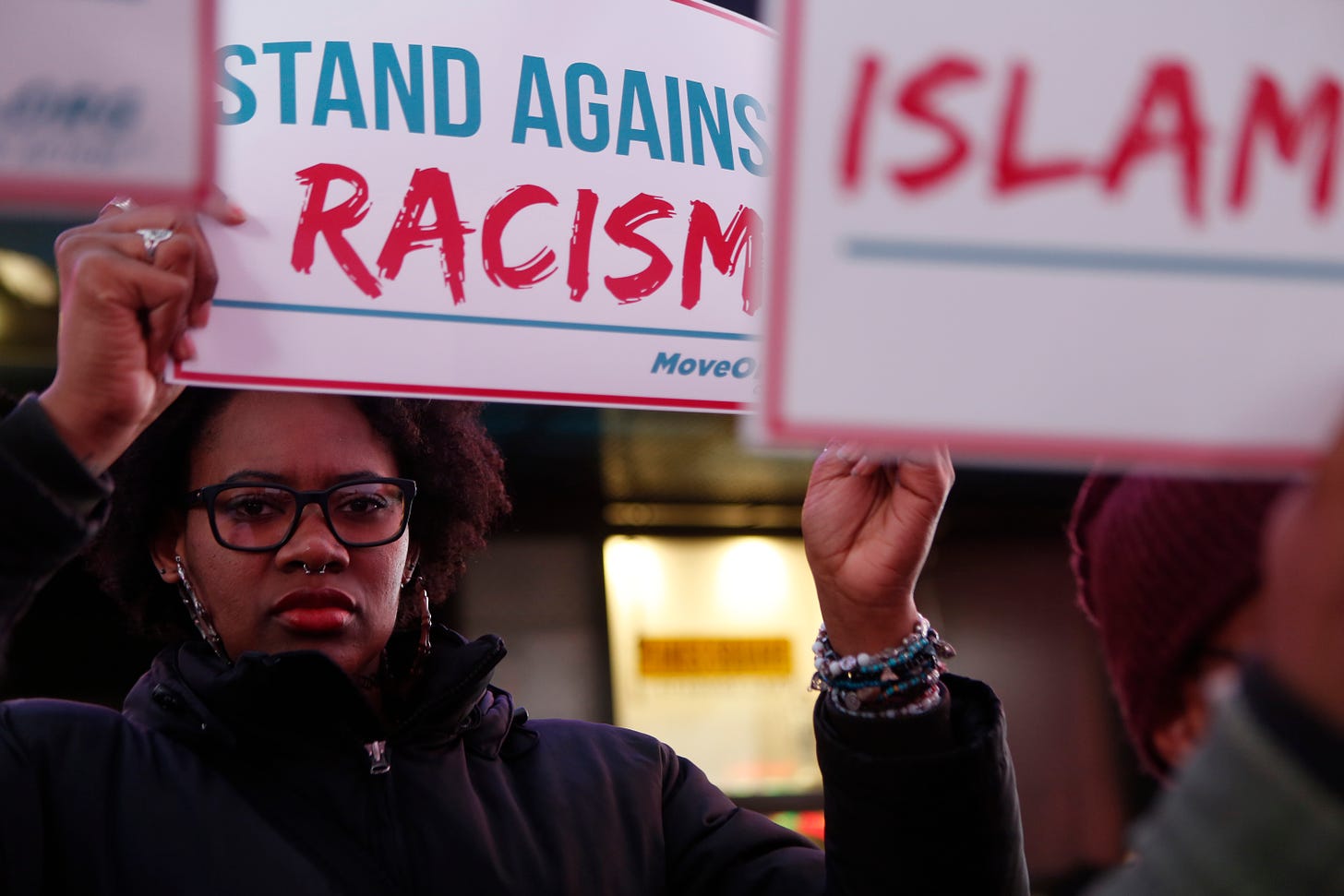
How to Run Against Trump's Racism

Donald Trump's calculated racial incitements threaten minorities and dishonor us all. Given the rising threat of impeachment, Trump is likely to step up his efforts to rally his supporters by inflaming race-based anxieties. In turn, Democrats must continue addressing those issues, beyond impeachment ,which concern voters most.
Yet some Democrats still fear that unequivocally denouncing Trump's racism will alienate blue-collar whites strategically spread across vital swing states.This fear is worse than timorous—it's self-defeating. With our society on the knife's edge of history, actively rejecting Trump's white identity politics is a moral and political imperative.
First, moral awareness requires acknowledging America's ongoing racial tribulations. That means internalizing William Faulkner's admonition that "The past is never dead. It's not even past."
Alone among "immigrants," 400,000 Africans were brought to this country in chains. Implicitly woven into the fabric of our Constitution, legal slavery lasted longer on what is now American soil—246 years—than the 154 years since the Civil War. And the ongoing post-bellum history combines the systemic subjugation of Blacks with a stubborn obliviousness to racism's impact and persistence.
One foundational aspect of racial understanding is comprehending how race has distorted our fundamental concepts of law, freedom, and democracy. Slavery rested on a perverse definition of liberty: the freedom of whites to commoditize blacks—unimpeded by the federal government—as legally-enforced by slave states. Its legacy combined the overtly racist politics of segregation with an intricate legal latticework which systematically deprived blacks nationwide of economic and political equality and, even now, combines discriminatory law enforcement with some statewide efforts to suppress minority voting.
That's what most impresses about American racism: its hydra–headed persistence. As piercingly captured in Henry Louis Gates' Stony the Road, 12 years of Reconstruction were brutally supplanted by 9 decades of adamantine re-segregation at molecular levels—enforced not just by "literacy tests" and lynchings but by the U.S. Supreme Court in decisions such as Plessy v. Ferguson. Blacks fleeing the South encountered pervasive discrimination in employment and housing—including the "red–lining" which deprived them of America's most universal form of wealth creation: rising home values.
It is, therefore, a surpassing historic irony that white bigotry bred a civil rights movement which lifted America above itself. As Nikole Hannah-Jones wrote in the New York Times:
Yet despite being violently denied the freedom and justice promised to all, black Americans believed fervently in the American creed. Through centuries of black resistance and protest, we have helped the country live up to its founding ideals. And not only for ourselves—black rights struggles paved the way for every other rights struggle, including women's and gay rights, immigrant and disability rights.
Without the idealistic, strenuous and patriotic efforts of black Americans, our democracy today would most likely look very different—it might not be a democracy at all. Concludes Hannah-Jones: "For generations, we believed in this country with a faith it did not deserve. Black people have seen the worst of America, yet, somehow, we still believe in its best."
Still, the worst persists.
The peculiar politics of the segregated South, the poisoned fruit of slavery, has migrated from the Democrats to the erstwhile party of Lincoln. In the wake of the Civil Rights Acts of 1964, white Southerners flocked en masse to the GOP. Declaring that states' rights were "disappearing under the piling sands of absolutism," that year's Republican presidential nominee, Barry Goldwater, condemned Brown v. Board as an "unconscionable trespass into the legislative sphere of government." Writing in The Conscience of a Conservative, Goldwater proclaimed :"I therefore support all efforts by the states, excluding violence, of course, to preserve their rightful powers over education"—specifically, by keeping black kids out of white schools. The "solid South" became—and largely remains—solidly Republican.
Fifty-five years later—four centuries after American slavery began—the politics of bigotry continues to infect our democracy, including one of its most familiar elements: limiting the political power of non-whites. Any Republican shocked by Trump's overt racial animus—mendacious claims of minority voting fraud; the vilification of desperate refugees; the suggestion that congresswomen of color should return to the country of their ancestors' origin—is neck deep in denial about what their party has become.
Witness the GOP's promulgation of state voter ID laws, ostensibly aimed at non-existent voter fraud, to keep their electorate disproportionately white. Witness, further, Chief Justice Roberts' opinion in the Shelby County case, wherein he invoked two complementary fictions: that the wave of Republican-sponsored voter ID laws were not racially motivated: and that racial progress in the South was so remarkable that scrutinizing these laws prior to their imposition was unfair to the white-controlled legislatures which passed them. This typifies the intellectual and moral contortions through which Republicans deny their reliance on racial politics.
No wonder, then, that one can count Republican officeholders who denounce Trump’s racist tropes on the fingers of one hand. Dodges abound. It's not bigotry, some murmur, just strategy. Others claim, remarkably, that they are the victims, unfairly tarred with a racism of which they are innocent at heart. Still others, more canny, understand that overt appeals to racial anxiety helps cloak Trump's largess to the GOP donor class—as though a cynical bait and switch makes bigotry less bigoted.
One thinks of those days, barely bygone, when systemic racism was recast as a principled vindication of states' rights. In this construct, racism is only racism when a person of color gets shot—and then only with respect to the racist who pulled the trigger.
Minorities know better. They also know that only the other party can stand up for their interests, but only if it chooses to—without surcease or equivocation.
And here moral urgency merges with political practicality.
Democrats did not lose Michigan, Wisconsin and Pennsylvania simply because they lacked white votes, but because too many non-whites failed to vote. Should these missing minority voters show up for Democrats in 2020, they could make the difference between victory and defeat—not just in Midwestern swing states, but in North Carolina. Georgia, and Arizona.
But to attract minority voters Democrats must stand, among other things, for ending cruel immigration practices; unequal law enforcement; unjustified police shootings; discriminatory voter ID laws; and disproportionate racial incarceration. And also for the building blocks of full citizenship: better access to education and housing.
The corrosion of income equality impacts African-Americans in particular. In 2012, blacks earned, on average, 80 percent of what whites did; by the first quarter of this year, that figure had declined to 76 percent. Given the economic history of black Americans, Democrats should focus on creating a more equitable and inclusive economy which promotes better jobs and higher wages.
But the political practicality of running against Trump's racism does not stop with minorities. Many white voters of goodwill, suburban or otherwise, want to believe that America does—or should—work for everyone, and are thereby repelled by Trump's appeals to bigotry. White identity politics is not the hill they want America to die on.
This is not Panglossian progressivism. A recent Fox news poll found that 63 percent of respondents objected to Trump's attacks on "the squad," and that 57 percent believed that he "does not respect racial minorities." A Quinnipiac poll recorded corresponding sentiments—including that 51 percent of respondents believe Trump racist. A USA Today/Ipsos poll yielded strikingly similar results.
For whites of varied ideologies, Trump is simply asking too much: that they become complicit in his racism. Democrats can offer them the chance to think better of themselves and their country.
A critical component to this is spelling out the links between Trump's racist provocations and racial violence. Economics are complicated; murder is not. That Trump has fed our quickening cycle of race-based shootings is painfully apparent.
Beto O'Rourke captured this argument well: "We've had a rise in hate crimes every single one of the last three years, during an administration where you have a president who's called Mexicans rapists and criminals. He is a racist, and he stokes racism in this country. And it doesn't just offend our sensibilities; it fundamentally changes the character of this country, and it leads to violence."
Most Americans do not want to identify with such a leader—including, it seems clear, the majority of whites. The ultimate point is not that Trump is a racist, but what his racism does to America writ large: sow bigotry and violence.
Trump has put the question squarely: what kind of country do we want to be?
In the Atlantic, Adam Serwer wrote:
Prior presidents, such as Richard Nixon, have exploited racial division for political gain. But we've never seen an American president make a US representative, a refugee, an American citizen, a woman of color, and a religious minority an object of hate for the political masses, in a deliberate attempt to turn the country against his fellow Americans who share any of these traits. Trump is assailing the moral foundations of the multiracial democracy Americans have struggled to bring into existence since 1965, and unless Trumpism is defeated, that fragile project will fail…
This is not about [Representative Ilhan] Omar anymore, or the other women of color who have been told by this president to 'go back' to their supposed countries of origin. It is about defending the idea that America should be a country for all its people. If multiracial democracy cannot be defended in America, it will not be defended elsewhere. What Americans do now, in the face of this, will define us forever. For reasons moral and political Democrats can turn Trump's white identity politics back against him. To accept Trump as president is to abandon our highest ideals—for our country, and for ourselves.
As a society we may have far to go. But most Americans have come too far to see themselves in Trump—and precious few of them want to.











